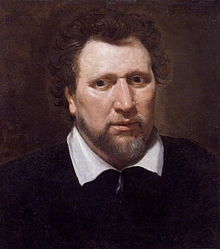EN360 Ben Jonson in Context
Revision Sessions:
Monday 23rd April 2018, 10.30-12: (catch-up) Masques with Caroline doing her presentation
Thursday 26th April 2018, 10.30-12: Exam preparation session.
Monday 30th April 2018, 10.30-12: Jonsonian Comedy revision session (in general, thinking about trajectory from early to late Jonson)
Module Convenor: Dr Tess Grant [email] t.grant@warwick.ac.uk
Seminars: Mondays in Term 2 only, 10:30-12:00 in H516.
Spring term only
One weekly one and a half hour seminar
To make coherent two-term options students might wish to pair this one-term module with these autumn-term options:
EN356 The Classical Tradition in English Translation: The Renaissance, to focus on English early modern classicism,
or EN353 Early Modern Drama, to focus on early modern drama.
Another suitable combination might be EN347 Shakespeare and the Law.
This module will explore the works of the great early modern classicist, poet and playwright Ben Jonson. The course will include examples of Jonson's work in several genres -- plays, masques, poems and translation. As we read Jonson's work -- both well- and less well-known -- we will develop an understanding of its place in its literary milieu, both as Jonson conceived of it, and how retrospect has judged it. We will take particular note of early modern literary and dramatic criticism to discover how Jonson explored these notions in his work. We will also consider Jonson in relation to Shakespeare in the views of their contemporaries and of posterity.
This is deliberately a higher-level specialist early modern module. Students must demonstrate an honours knowledge of the early modern period before they undertake it. This would probably include having done (or be doing) one of the following modules: EN228 The Seventeenth-Century; EN353 Early Modern Drama; EN301 Shakespeare and Selected Dramatists of His Time; EN356 The Classical Tradition in English Translation: The Renaissance. Students from outside the department (e.g. Theatre Studies) might offer early modern theatre modules as evidence of a good grounding.
Texts
Week 1, The Forest (1616) and Horace's Art of Poetry, translated by Jonson (1640)
Week 2, Every Man in His Humour (1598)
Week 3, Cynthia's Revels (1600)
Week 4, Sejanus (1603)
Week 5, Eastward Ho! (1605) and/or Volpone (1606)
Week 6, Reading Week
Week 7, Masques: Prince Henry's Barriers (1610); Masque of Oberon (1611); Christmas, His Masque (1616); The Gypsies Metamorphosed (1621)
Week 8, Epicoene (1609)
Week 9, The Alchemist (1610)
Week 10, Bartholomew Faire (1614)
The coursebooks will be Oxford World's Classics Ben Jonson: Five Plays (ed. G. A. Wilkes; Oxford 1981; reissued 2009) and the Delphi Kindle edition of The Complete Works of Ben Jonson. Students may also wish to purchase the New Mermaid Epicoene (ed. Holdsworth), used from £0.16, and the New Mermaid or Revels Eastward Ho!. You can also get a Carcanet Epigrams and The Forest (ed. Dutton).
Further Reading
Each week there will be short additional readings to help you understand the play in its context. These are generally sourced from e-books available via the library website, or scanned and made available via the library's module extracts page. Click here to download a file of the week by week reading. Some suggestions for even further reading are at the end of this file.
Advance Preparation
The most important thing is to ensure that you have a good grasp of the primary texts, so your advance preparation should focus on reading them. I would also recommend James Loxley's excellent The Complete Critical Guide to Ben Jonson (Routledge, 2002) which takes you through the parts of Jonson's career chronologically and has a section on each text. The library has just bought this as a multi-user e-book so it is now available via the library website. You can buy the Kindle edition for £14.26, and there are some second-hand copies available on Amazon at c. £7.
Assessment
The module is assessed by 50% assessed (a 3000 word essay) and 50% examined (a one-hour seen examination paper). Please click on the tab above (EN360 Learning Outcomes) to remind yourself what your essay should show you can do.

